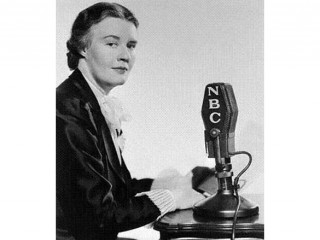
Dorothy Thompson biography
Date of birth : 1894-07-09
Date of death : 1961-01-30
Birthplace : Lancaster, New York, U.S.
Nationality : American
Category : Famous Figures
Last modified : 2011-03-02
Credited as : Journalist, radio broadcaster NBC, Eleanor Roosevelt
The outspoken conservative American journalist Dorothy Thompson was one of the earliest women in her field. Her commentaries reached a very large audience in print and radio from the 1930s through the 1950s.
Dorothy Thompson was born in Lancaster, New York, on July 9, 1894. When she was ten her mother died, and she correctly predicted that her father, a Methodist minister, would marry Eliza Abbott, the church organist. When she rebelled against her stepmother, her father, whom she adored, required her to memorize and recite Bible passages as punishment. His critiques of her recitations undoubtedly contributed to her future speaking effectiveness.
Thompson eventually went to live with an aunt in Chicago to resolve the conflict with her stepmother. There she attended high school and Lewis Institute where she was quite popular and captain of a basketball team, but hardly a brilliant scholar. She entered Syracuse University in 1910, worked her way through college, and planned to become a teacher, but she failed in grammar. When women's suffrage was debated she toured New York making speeches for that cause.
During World War I, Thompson financed her own trip to Europe and enroute met a group of Zionists. She convinced International News Service to let her report on their conference, which made her one of the few women correspondents in Europe. Her intelligence, hard work, and prowess as a reporter soon earned her the respect of seasoned newsmen. As a correspondent in Vienna she travelled in cosmopolitan literary circles where she met and married writer Joseph Bard in 1923. As Thompson's career eclipsed Bard's, they divorced in 1927.
In 1925 Thompson had become head of the New York Evening Post's Berlin office. Soon she met Sinclair Lewis, renowned author of Main Street, who was so smitten by Thompson that he pursued her throughout Europe. They married in 1928 and their son Michael was born in 1930.
Back in America Thompson led a domestic life and wrote her book I Saw Hitler (1932), which was based on an earlier interview with him in Berlin. At that meeting she had been so unimpressed that she predicted he could never become a powerful leader. After that error in judgment she repeatedly attacked him and his regime. Her attacks seemed sincere; she had grown to love Germany and its culture from her long residence there. She spoke and wrote excellent German, often cooked German foods, and employed German servants in her Vermont home.
In 1936 Thompson began writing a column for the New York Herald Tribune. She cultivated a large "brain trust" which included David Sarnoff and Wendell Wilkie whose opinions she valued. German intellectual refugees brought "grapevine" reports, and those contacts resulted in her book Refugee, Anarchy or Organization? (1938), which was credited for Roosevelt's decision to call for the refugee conference at Evian, France. She also collaborated with Fritz Kortner on a play for a refugee benefit entitled Another Sun (1940) which was panned by critics and ran slightly over a week.
Thompson made trips to Europe to observe war developments in several countries, but could not return to Germany, having been expelled from there by Hitler because of her negative views of Nazism. (Similarly, in Russia she was persona non grata because of her views on Communism.) She continued to write dramatically of the dangers of Nazism to Western democracies and challenged the views of Charles Lindbergh and other isolationists.
As Nazi troops swept across Europe, Thompson insisted that "we, who are not Jews" must speak out while anti-Semitic groups accused Jews of trying to drag America into Europe's war. As if to punctuate her views, she talked her way through police lines into the German-American Bund meeting to salute their leader Fritz Kuhn. As anti-Semitic orators lashed out against Jews and "Jew-loving" Roosevelt, Thompson repeatedly burst into laughter and shouted "bunk" until she was escorted out by police.
Frequently called "First Lady of American Journalism, " Thompson also reached large audiences through her radio broadcasts in the late 1930s. In 1937 Thompson began writing a column for Ladies Home Journal, setting her own price at $1, 000 a column. It appeared regularly for over 20 years. She also wrote articles for Saturday Evening Post and Foreign Affairs. By the late 1930s only one woman— Eleanor Roosevelt—matched Thompson's audience. Time (June 12, 1939) declared then that Roosevelt and Thompson were undoubtedly the most influential American women.
As her professional popularity grew, her marriage to Sinclair Lewis deteriorated, and they were divorced in 1942. (In mid-1943 she was more happily married to artist Maxim Kopf, who succumbed to a heart attack in 1958, the same ailment which took her life in 1961.)
















